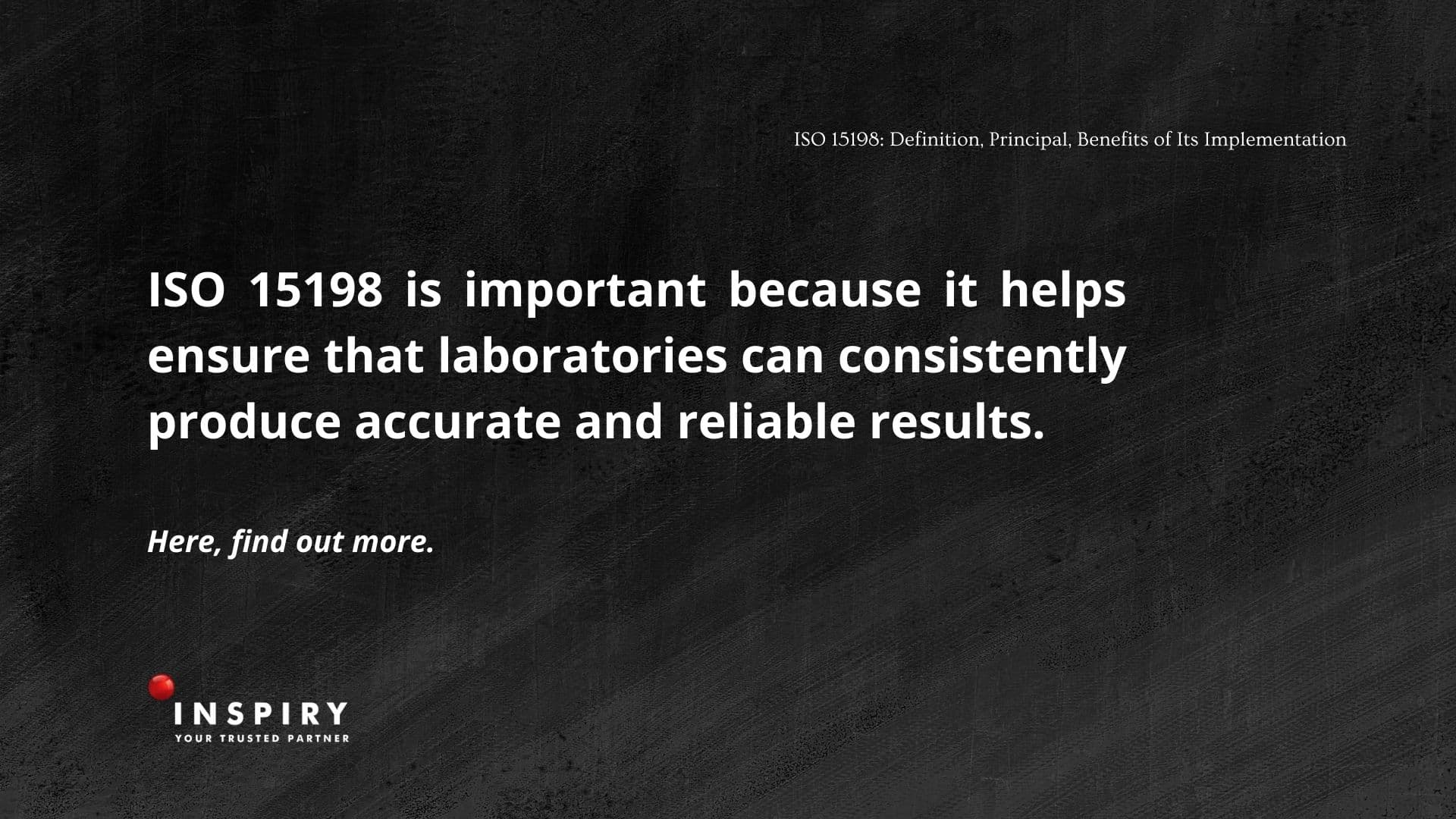
Blog Detail
ISO 15189: Definition, Principal, Benefits of Its Implementation

Definition:
ISO 15189 Medical laboratories—Requirements for quality and competence is an international standard that specifies quality management system requirements specifically for laboratories. A revised version was published in 2012 that cancels and replaces the older version released in 2007.
The standard was developed by the ISO technical committee—ISO/TC 212. They commissioned the ISO 15189 working group to prepare the standard based on the details of ISO/IEC 17025 (General requirements for the competence of testing and Calibration laboratories).
This standard establishes a rigorous set of quality management requirements specific to laboratories at every level of the healthcare system. Some of the standard's objectives for laboratory operations include ensuring the quality and traceability of patient information, maintaining the safety and integrity of laboratory materials, monitoring facility environmental conditions, and supporting public health decision-making.
This International Standard ISO 15189 is the gold standard for medical laboratory certification as it covers both management and technical requirements needed to assess personnel competence. A medical laboratory is a laboratory used for the examination of the human body in order to obtain information on the diagnosis, prevention, and treatment of a disease or assessment of its health. The scope of the diagnosis is: biology, microbiology, immunology, chemistry, immunohematology, hematology, biophysics, cytology, pathology, and others.
Then the lab can also provide:
Consulting services that cover all aspects of laboratory research including interpretation of results and advice on follow-up examinations.
Testing clinical specimens for health and disease prevention.
ISO 15189 certification is therefore a guarantee that the laboratory has been assessed against an internationally recognized standard that aims to improve the existence of quality systems, and technical competence, and that personnel are actually capable of producing technically valid results and information suitable for the intended use of each test.
In structure, ISO 15189 is a standard based on a combination of ISO / IEC 17025 and ISO 9001 which is complemented by special requirements for medical laboratories, namely CAP (College American Pathologist). CAP is a laboratory competency and quality management system requirement for organizations whose business is the testing of human or clinical specimens. These medical laboratory technical requirements are similar to ISO 17025 requirements, plus personnel competency, reagent requirements, pre-exam, examination, and post-exam.
The implementation of ISO 15189 is divided into two parts:
Management requirements, which are general requirements relating to the quality management system.
Technical requirements are specific requirements related to the activities performed by the clinical laboratory.
The first part of ISO 15189 is based on ISO 9001 requirements so laboratories that are ISO 15189 certified must also implement ISO 9001. The ISO 9001 quality management will support the second part, which is the technical activities of a medical laboratory consisting of. :
security systems.
data entry and reports
data media
system maintenance
and other activities related to ethics in medical laboratories.
The primary purpose of a quality management system is to assist organizations in improving performance and making continuous improvements. The general principle of healthcare ethics is that patient safety comes first, so the application of ISO 15189 in medical laboratories is to try to ensure the safety and interests of patients.
Principal:
The technical requirements of ISO 15189 apply to personnel, accommodation, environmental conditions, laboratory equipment, reagents, and consumables, pre-examination processes, examination processes, ensuring the quality of examination process results, post-examination processes, results reporting, results release, and laboratory information management.
The ISO 15189 standard is important for many reasons. First, it guides how to set up and operate a quality management system for medical laboratories. This is important because it helps ensure that laboratories can consistently produce accurate and reliable results. In addition, the ISO 15189 standard helps harmonize the quality of medical laboratory services around the world. This is important because it allows patients to receive the same high level of care regardless of where they live.
Finally, the ISO 15189 standard helps ensure the safety of laboratory workers. This is especially important because laboratory workers are often exposed to hazardous materials. By following the ISO 15189 standard, laboratories can help protect their workers from potential hazards. According to the ANSI National Accreditation Board (ANAB), ISO 15189 includes five additional requirements for medical laboratories. These are:
Implement ethical practices.
Collecting information on a range of procedures, sample volumes, and containers.
Provide judgment on test results related to patient care and diagnosis.
Collaborate between clinical and laboratory staff who are accountable to physicians who refer patient samples for testing. Guide the different types of samples and tests that may be required in the laboratory. So, why is it important for laboratories to get ISO 15189 certified? There are several reasons:
Helps ensure that the laboratory provides accurate and reliable results.
Builds trust in the laboratory among patients, doctors, and other stakeholders.
Helps laboratories to attract new business and win contracts.
ISO 15189 certification is not mandatory, but it is no exaggeration to say that it is highly recommended. Especially when you are dealing with public health, a better question might be 'Can you afford not to be ISO 15189 accredited? As a globally recognized quality standard, laboratories that don't have ISO 15189 will quickly lose their status as a preferred supplier. Worse still, you will probably fail to meet the standards of the stringent tender application process. Furthermore, as laboratories around the world look to standardize their practices as far as possible to enable better data sharing, many see ISO accreditation as an important step towards globally consistent data. Overall, ISO 15189 certification is important for laboratories as it helps ensure that they provide accurate and reliable test results to their clients. This, in turn, helps build trust in the laboratory and provide quality services to its patients or customers.
Benefit:
Encourages a strong level of consistency in conformity with medical laboratory laws and regulations from both an international and national perspective.
ISO 15189:2012 certificate promotes laboratory efficiency and responsibility for better results and service delivery.
Promotes modern laboratory practices that include professionalism and expertise in the conduction of medical activities in laboratories.
Promotes the development of an internationally reputable image for your organization through Quality Assurance and Management Systems.
Increase consumer confidence through Problem Solving and Continuous Improvement.
Preventing unnecessary duplication of the collection of information on performance that is often required by regulatory bodies.
Ultimately promoting the growth of customer satisfaction within organizations involved in medical laboratory testing.
Contributor: Lestari CN
